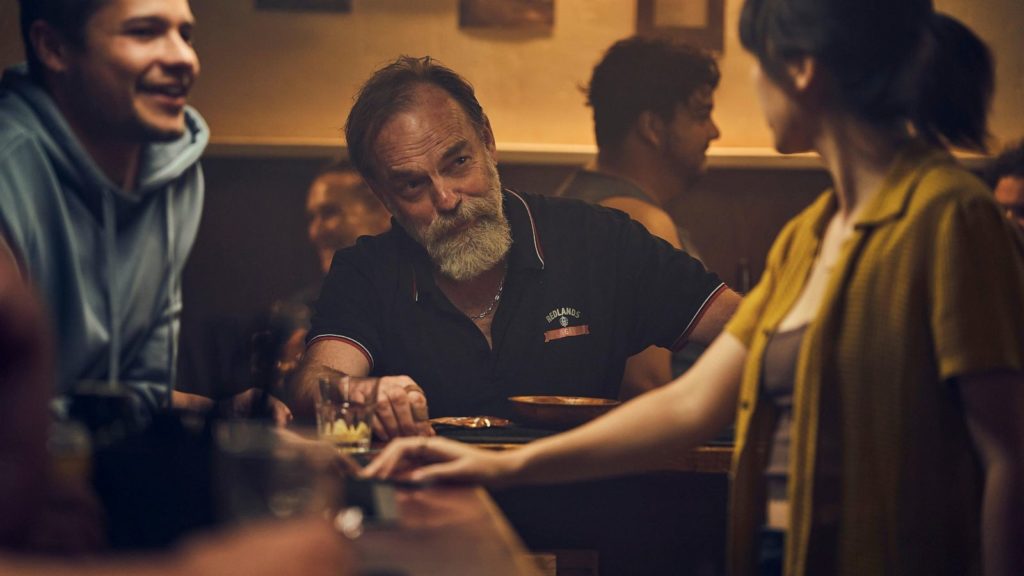
Cinema teaches us that female travellers in remote climes are not in for an easy time of it. Perhaps it’s sending a message: get straight to work. Don’t risk a gap year or a prolonged vacation; it’s just not worth it. The Royal Hotel (2023) certainly starts out along those lines, though it shifts things around almost from the start by having our protagonists Liv (Jessica Henwick) and Hanna – no extraneous ‘h’ – (Julia Garner) running out of money aboard a party boat, a place every inch the monstrosity you’d expect it to be, namely a thumping, pan-global queue of whooping party people trying and failing to ask one another the question, ‘So, where are you from?’ Come to think of it, it’s not a bad summary of the film to follow.
The girls can’t stay here; they need to earn money to see them as far as their Shangri-La, Bondi Beach, so they find an agent who promises them temporary work at a bar in a remote mining area of the country. Said agent warns them that they might be in for a certain amount of ‘male attention’ there, and Liv – we imagine, rather naively – seems good with that, though in the next breath she’s asking if there are any kangaroos. To her, unwanted male attention and roos are all part and parcel of the Australian experience. The girls make their way to the Royal Hotel, through a clearly vast expanse of land requiring travel by rail, bus, and finally a lift from sometime bar manager Carol (Ursula Yovich) who picks them up a couple of miles out.
The Royal is an emblem of faded Colonial grandeur, way out in the wilderness: the film isn’t terribly subtle with its visual cues, and the Royal is no exception. It’s the same colour inside as the sandy landscape outside. Even the tattered leather sofa upstairs is a shade of beige. The girls get settled in to their new digs, and then they’re thrown into the job itself, after some rudimentary training from landlord Billy (Hugo Weaving), which seems to mainly mean slamming things as hard as possible to ensure closure. That could be another visual clue, or else Billy has really neglected the upkeep of the bar, which could be the same thing. As for the bar, it gets lively and yes, they get a bit of pushback from the locals, but Liv clearly takes to the work a lot more readily than Hanna who – come to think of it – looks haunted and rather wan, even a bit – beige. She immediately wants to leave; amongst other things the casual Oz deployment of the ‘c’ word leaves her cold – but Liv think this is too hasty. After all, the two British girls they are about to replace – there’s a day’s overlap – seem to have done alright? They can clearly hold their own, have held their own. And when Liv and Hanna get to see a few of the sights, finding some time for more standard holiday activities like swimming and sunbathing, even Hanna warms up a bit.
So what, or who, is going to precipitate the crisis here? We know it’s coming. We can feel it. The incidental music (excepting Kylie) speaks of it. There wouldn’t be a film otherwise. Perhaps it’s when Billy begins to absent himself for days at a time, leaving two inexperienced girls to fend off the attentions of the predominantly male clientele, amongst whom the surprisingly-named Dolly (Daniel Henshall) is the figurehead, always pushing the ‘smile, darling’ and ‘it was just a joke’ banter into threatening territory. Or perhaps the crisis will stem from the girls themselves? There must be a reason Hanna is so closed-off and taciturn and, well, to remove the charming suffix Dolly gives the descriptor, a bit ‘sour’.
A lot of what makes and keeps the film engaging is in wondering about this: this process could, admittedly, be coloured a certain way if, like me, your experience of Australian film has tended to come from Ozploitation, so you may be expecting ultraviolence to break out at any moment. But this ain’t Wolf Creek, and nor is it Outback, where the threat comes from the harsh environment. And that’s fine, as, while we wait, there’s lots to enjoy. The people here are rounded enough to hold interest and the cracks running through their lives are fine and plausible, even whilst not overwritten. The two girls are perhaps a little obviously adrift and clueless at first, with some clunky lines and notions, but things improve as events begin to unfold around them; they are fleshed out more by how they respond, often quietly, to life in and around the bar And, along the way, the sheer amount of casual drunkenness in the film generates a lot of fumbling, retching unease and disorientation, with some humour and pathos too. It’s all doled out carefully. It must be building up to something pretty special.
Fans of languid, journey-not-destination cinema, which is happy to disrupt expectations, will likely remain enthused by the ways things play out in The Royal Hotel, but many viewers will feel a sense of diminishing returns here. Even those harsh visual cues, with their hard, obvious symbolism – snakes, storms, axes – surprisingly peter out, as does the seemingly smouldering, festering misogyny, pressing it at the film’s edges. So attention turns to Hanna, with the assumption that Garner’s rather staid performance must be poised to reveal something deliberate at the heart of her character. Instead, we get a rather disconcertingly janky ending which feels like a ninety-minute non-sequitur, especially after hinting at something tangible, some reveal or purpose.
Did the film know it was going to end this way? It all feels oddly unclear at the end, another shouted question in a rowdy bar, with no clear answer. So perhaps we come full circle, in a way, but the shift in pace, tone and detail at the end feels like something gone awry. Being left with questions at the end of a film is fine, but equally, we should feel able to glean something via what has come before. The Royal Hotel doesn’t give us that, which makes for a thin, rushed conclusion to an otherwise carefully-drawn and engaging preamble.
